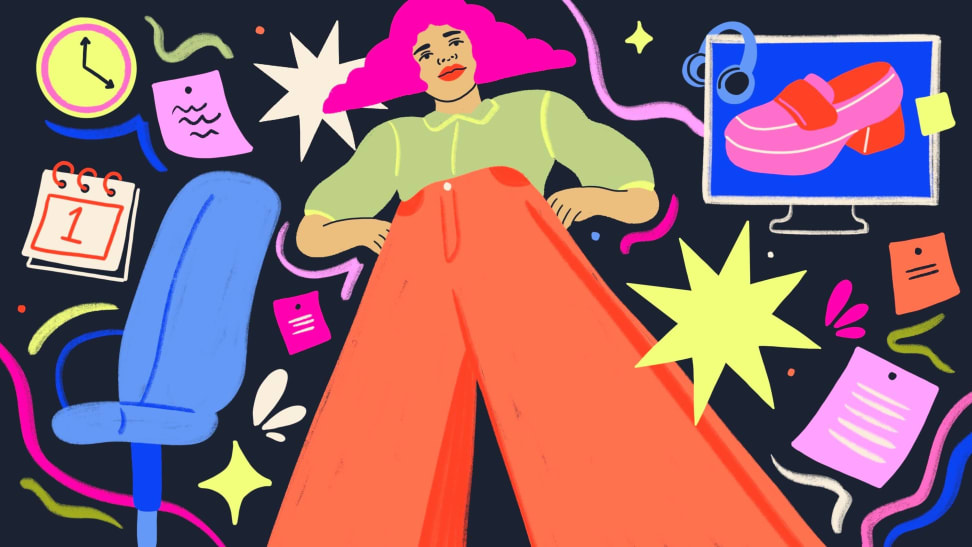Yes, you can dress for success—here’s how
Posted by admin on
 — Recommendations are independently chosen by Reviewed’s editors. Purchases you make through our links may earn us a commission.
— Recommendations are independently chosen by Reviewed’s editors. Purchases you make through our links may earn us a commission.If you’re looking to head into the new year with productivity in mind, consider this: It can start with the way you dress. Striving for better health in 2022 can be made easier through the act of building an outfit that keeps you happy, alert, motivated, and focused, simply by following some theories within psychology.
To help guide you through the process of dressing for success, we spoke with Camay Abraham, a journalist, researcher, and fashion psychologist, to break down the ways in which you can use fashion to become a more effective person throughout the new year.
What to know about dressing for success

There are symbolic meanings associated with wearing clothes—no matter the garment.
Similar to dressing for happiness, it’s important to remember that people attach sentimental meaning to the clothing that they wear. What Abraham would like to further stress is that everyone has a psychological relationship with clothing—whether you’re a fashionista or not. Clothes, she says, are tools you can use to present your psyche in public. “How you see clothing and its relation to you and your body plays into your outlook,” she says. “Everyone uses clothing for a different purpose, whether it's for functionality or projecting some kind of idea—to be more or less masculine or feminine, or to represent some type of story that you want to present to the world.”
To further undress (pun intended) the cerebral associations with clothing, Abraham points to research conducted in 2012 that aimed to uncover the link between clothes and behavior and mood. In the study, two groups were presented with white lab coats. One group was told the coat was a painter’s jacket; the other was told it was a doctor’s coat. The two groups were then given simple admin tasks to complete while wearing the coats. It turned out that the group who wore what they perceived as doctor’s coats performed their tasks more attentively and carefully compared to the group who were told they were using a painter’s coat. The results of this study defined what fashion psychologists deem as enclothed cognition—“the symbolic meaning and the physical experience of wearing clothes.”
You can apply enclothed cognition to your own outfits to help you build motivation and confidence. For example, if you wear clothing closely associated with academia, science, tech, or medicine—such as a lab coat, a jacket with elbow patches, black derby shoes, or an oxford button-down—it may boost your own self-esteem and help create an aura of importance around you. Similarly, if you dress in athleticwear or workwear, this may inspire you to be more active or readily able to handle labor-intensive tasks, like mowing the lawn or running errands.
What you can wear to boost focus

For remote workers, it's a good idea to ditch the loungewear in favor of more structured clothes.
For those who want to feel alert and focused, Abraham says the theory of embodied cognition—the idea that the mind is not only connected to the body but that the body influences the mind—can help you build a productive outfit. A common example of embodied cognition is the response you may have to hearing a dentist’s drill—the noise can trigger your body to tense up and cause you to wince in response.
To translate this idea positively into the fashion space, Abraham uses high heels as an example. Putting on high heels changes the wearer’s posture, shifting the body forward and causing an upright stance which, in turn, results in a more confident stride and a feeling of empowerment. You can also apply this idea to the way fabrics feel on the body. Stiffer fabrics, like denim and duck cloth, can cause the body to become more alert due to their hard-wearing presence. On the opposite end are soft fabrics, like cotton and lyocell, which wearers will associate with rest or downtime. More structured pieces of clothing, like a tailored blazer or trousers, can also affect your perceived posture, psychologically influencing you to become more focused.
Dressing up for your job, whether you’re abiding by a dress code or not, can kickstart your productivity—especially for those who work remotely. “That act of changing from one outfit to another tells your brain that you’re changing activities, and switching into a different mindset for a specific task,” Abraham says. “Depending on your associations, this can affect how you behave and think at work.”
For remote workers who struggle with attention, Abraham suggests ditching loungewear in favor of more structured fabrics, like denim, to jumpstart your brain. “It's less comfortable, so it'll tell your brain not to relax as much,” she says. Those who take meetings on Zoom should also consider how their shoulders appear and dress to flatter them, with a blazer or sweater vest, for example. Ultimately, while working from home, you should be focused on how you feel and how you look in an outfit, compared to being onsite, where you might also consider how others perceive you.
This doesn’t mean you necessarily should view work attire as a uniform, even if you’re required to wear one. You can express yourself by adding little personal touches. Hairstyles, makeup, or even fragrances can make you stand out from your coworkers, even when sartorial autonomy is taken away, by utilizing the other senses as tools of self-expression.
When in doubt, take inspiration from others

Officewear like blazers, sweater vests, and trousers are clothes to use as motivation-boosting tools.
If you’re unsure of what you can use in your current wardrobe to help you become a more productive person, Abraham recommends thinking about what success looks like, taking into account your current job and personal career goals. Once you’ve defined that, you can dress toward that aspiration. You may also style yourself after celebrities, influencers, and professionals whom you find inspiring.
Still, the idea of dressing for success is subjective and based on a combination of personal experience, cultural and generational expectations, and sartorial preferences. Abraham associates officewear like blazers, sweater vests, and trousers with focus and productivity, so she prefers wearing those items to tell her brain it’s time to work. “Because I work in the same space all day, every day, my brain starts to forget what activity it’s doing and sometimes goes on autopilot,” she explains. “So I use these little tips and tricks, and combine tactics from both enclothed cognition and embodied cognition.”
The product experts at Reviewed have all your shopping needs covered. Follow Reviewed on Facebook, Twitter, Instagram, TikTok, or Flipboard for the latest deals, product reviews, and more.
Prices were accurate at the time this article was published but may change over time.




